Mikyung's Story
Beginnings
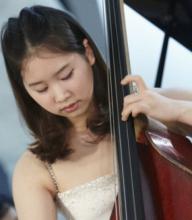
Life from then on was consumed with practice, five hours a day, often until midnight. Like her brother before her, her progress was swift. She performed her first solo concerto with the local orchestra at the age of 12. The family concertized together all over Seoul. An appearance by the whole family in the famed Kumho Art Hall, when Mikyung was 13, was well received. In later years she appeared there on her own in Prodigy and Young Artist concerts, with her mother accompanying. She enrolled at the Sunhwa Arts School, and of course soloed with its orchestra. Other concerts followed, as did first prizes in Korean music competitions: the Baroque String Ensemble Competition, Haneum National Music Competition, Music Education Journal Competition, and Korea Double Bass Association Competition.
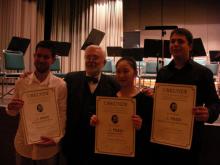
In 2006, her brother Minje, then 16, had his first international success by being the youngest contestant ever to win first prize in the International J.M. Sperger Double Bass Competition in Germany. (The next year he would also win the Koussevitzky Prize in Russia.) In 2008, Mikyung, then 15, narrowly missed out on beating her brother’s age record by one year, only managing to place fourth. When the Sperger competition was next held two years later, Mikyung, better managing her nerves, finally took the first prize, as well as two special prizes and the audience prize. She wasn’t the youngest ever, but she was still the youngest competitor that year, at 17, and the smallest. As a result she was invited by conductor Daniel Raiskin to perform several concerts in Germany.
She had enrolled in the Preliminary School of the Korea National University of Arts, eventually earning her Bachelor of Music degree there in 2013. There she worked with Ho-gyo Lee, her first bass teacher besides her father, who had long since become bewildered by his children’s level of skill, so much more advanced in solo repertoire than his own. Of course she soloed with the university’s orchestra as well.
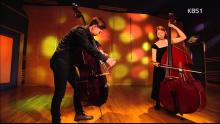
In the meantime, she was invited to appear on KBS1 (Korean Broadcast System) national television, first as one of four gifted young artists on a Classic Odyssey New Year’s special in 2011, and soon after as the featured artist on the first regular season episode of “Masterpiece Scandal,” a show that explored the hidden history behind a great work of art. (In this case, the true authorship of two songs by Felix Mendelssohn and his wife Fanny.) She received praise for her performance at the Pyeongchang Great Mountains Music Festival. Soon Minje and Mikyung were concertizing all over northern Korea as “2Bass” or the “MJK Ensemble,” giving numerous house concerts and playing in major concert halls as well. They also appeared on KBS1 as a duo in 2013, along with their mother, as the subject of an episode of Classic Odyssey where they were interviewed and played several pieces.
After graduating from university, Mikyung auditioned for two orchestras in Korea, winning both positions, including assistant principal in her father’s own orchestra. But she still had dreams of a career as a soloist, so she turned down both jobs, and instead applied to schools in the United States for graduate music performance studies. Acceptance to one of the most selective music conservatories in the world opened up a whole new chapter in her life.
The Colburn School, Los Angeles
The Colburn School in Los Angeles, a fairly young institution, is not yet as well known as older east-coast conservatories like Juilliard, the Eastman School, the New England Conservatory, or Colburn’s closest parallel, the performance-focused Curtis Institute. Colburn’s only goal is to train instrumentalists to be professional musicians, and it is well suited to do so. With world-class musicians as instructors, several fine concert halls, excellent practice facilities, free tuition, room, and board, and a downtown location across the street from the Los Angeles Philharmonic’s Disney Hall, Colburn students are steeped in, and surrounded by, the arts. With an acceptance rate of around 3-5%, only the very best have a chance of admittance. Nevertheless, Mikyung stood out even among that rarified crowd.
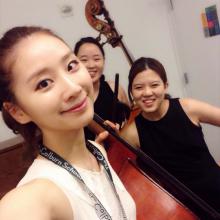
For the first time, Mikyung was independent, on her own, in a new country. She began studying with Peter Lloyd, who had played for eight years in the Philadelphia Orchestra and for 21 years as principal of the Minnesota Orchestra, as well as with many of the top chamber ensembles. She soon became a regular fixture at “Performance Forum,” a weekly Colburn ritual of Thursday noon-time concerts, with the entire faculty and student body invited to watch fellow students at the top of their game who were invited to appear by their teachers, followed by lunch for all in a rehearsal hall. She joined with her roommates, fellow bassist Sukyung Chun and pianist Eloise Kim, to form the Amoris Trio, including a concert at the Sierra Madre Playhouse. She eventually posted her first YouTube video, a blistering run-through of the Gliere Tarantella with Eloise Kim accompanying, recorded in a small Colburn recital hall, announcing to the world her arrival on US soil, as well as her seriousness as one of the world’s top bass virtuosi.
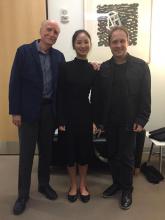
She made quite an impression at Colburn, performing with the Colburn Orchestra in Haydn's first cello concerto, and later a performance of Frank Proto's Carmen Fantasy, lauded by the composer as "one of the greatest performances of my piece I have ever heard," with Seattle Symphony music director Ludovic Morlot. She also gave numerous recitals, as well as more appearances at Performance Forum. She soon teamed up with pianist Jaemin Shin, marking her most productive musical partnership to date. She posted more videos to YouTube, earning instant praise for her stunning level of virtuosity and musicality. She worked with composers such as Frank Proto and Arni Egilsson in rehearsing their works, then giving definitive performances of them.
Meanwhile she continued competing: In 2015, the ISB (International Society of Bassists) competition in Colorado with Eloise Kim, resulting in 2nd place and the Thomas Martin prize for best performance of a work by Bottesini; a 2016 run to the second round of the ARD Competition in Germany with her mother accompanying; and a 2017 Honorable Mention in the finals of the Bradetich Competition in Texas, accompanied by Jaemin Shin, along with the internet-voted prize for best concerto performance of the Bottesini Concerto No. 2, well-earned by her stunningly beautiful rendition.
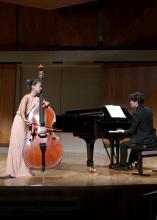
Along with her usual studies, she engaged in master classes, as so many students do, not only with prominent bassists but also cellists and violinists, such as members of the Guarneri quartet. This seems appropriate, as bassists frequently play music originally written for other instruments. Indeed, she has increasingly emphasized sonatas written for cello and even violin, such as those by Mendelssohn, Brahms, Grieg, Rachmaninoff, and Franck, with performances often rivaling those by top violinists or cellists. Unlike many students, her master class performances would usually be honed to the highest level of technical mastery and musical expression, posing an interesting challenge for teachers trying to give meaningful feedback.
She graduated from Colburn in the spring of 2017 with her Artist Diploma, but stayed around for another year to continue studying, as well as performing with Jaemin Shin.
Return to Asia
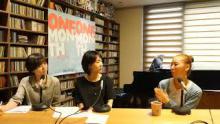
In early 2018, she auditioned for the Shanghai Symphony Orchestra and won a principal position, to start in the fall. This set her up for a return to Asia (Shanghai being only a two hour flight from Seoul). In the summer of 2018, she returned to playing at The House Concert in Seoul, participating with pianist Jaemin Shin in concerts and podcasts for the 2018 One Month Festival. She played two House concerts, the first including sonatas by Hindemith, Mendelssohn, Franck, and Rachmaninoff. This has resulted in some of her most mature and emotionally satisfying performances yet, including a deeply moving rendition of Bottesini’s second Elegy and an unusually colorful performance of Monti’s Czardas, both from the gala closing concert of the festival.
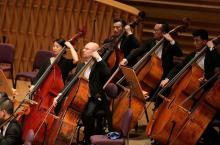
In the fall she joined the Shanghai Symphony Orchestra, including their concert from Beijing’s Forbidden City, broadcast worldwide and recorded for Deutsche Grammophon in honor of the label’s 120th anniversary. She also began teaching at the Shanghai Orchestra Academy, alongside members of the New York Philharmonic and NDR Elbphilharmonie. In the spring of 2019, she performed two recitals with pianist Ilya Rashkovskiy in Seoul. She also performed Frank Proto's Carmen Fantasy once again, this time with the Seongnam Philharmonic Orchestra in Korea. She resigned from the Shanghai Symphony Orchestra and Shanghai Orchestra Academy in 2019 to focus on her new family and solo career.
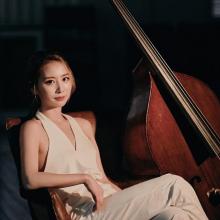
Mikyung plays a 3/4 size 1951 Charles Quenoil bass.
